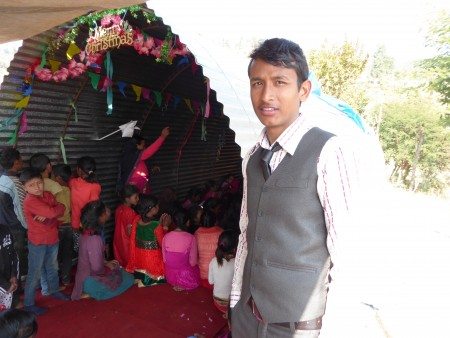On Christmas day, at 10:30am, Pastor Kumar Pokharel stood by the zinc structure that was his makeshift church, draping pink flower garlands across the entrance. He had a busy day ahead. In a little while, his small congregation would trickle in, some of them arriving after more than an hour’s walk across narrow mountain trails, to fit under the arched, corrugated sheets that made up this unusual church in the hilly district of Sindhupalchowk for the most important service of the year.
“We are so happy that we are together for this service,” he said. “We are happy to be celebrating, and happy to have a shelter to celebrate.”
Pokharel, who wore light blue jeans and a hooded sweater, is 24 years old. This morning, he had walked 30 minutes from the small hamlet that stood in a remote woodland clearing in the valley to get here, to ensure everything was in order for the service and the Christmas feast that was to follow. For his parishioners, today was important. All of them, to the last person, were struggling to rebuild their lives after the April earthquake. Most had lost their houses; many, loved ones. Today was respite. A short pause in a long ordeal, an oasis after a summer of sorrow. The pastor was nervous. He wanted the day to go without a hitch.
“Christmas is a little bit different here,” Pokharel said. “More people are not coming because people have their own problems. They don’t have homes. But I am happy because those people who are coming, they can enjoy each other … celebrate Christmas together.”

Pastor Kumar Pokharel. Photo: Patrick Ward
The protestant congregation that Pokharel serves is about 80-strong and lives in and around Sangachok, a village 70 kilometres east of Kathmandu. You need to walk 10 minutes from the main road, across a path of mud, rocks and rubble to reach the church, which stands atop a hill, amid a hamlet of metal shacks, overlooking a magnificent valley. The original church had stood a few kilometres away, but was destroyed in April. Pokharel and his parishioners had rebuilt this one on donated land a few months later, arching zinc sheets and rigging it with wires for electricity.
Finishing the decorations, Pokharel walked over to where a dozen or so parishioners had gathered. They sat around a large tarpaulin, slicing cucumbers, chopping tomatoes, boiling potatoes. A young man in a leather jacket was stoking a small wood fire, while a teenage girl crushed spices in a stone bowl.
By late afternoon, the congregation had gathered in the church, with a crowd spilling out into the tent that had been erected just outside. Pokharel had by now changed into trousers, shirt, tie and waistcoat. He took to the stage at the back of the church, plugged in his electric guitar. Three other singers climbed on to the stage and as the group began to sing Nepali hymns, the congregation, sitting cross-legged on the ground, began to clap and sway and pray.
